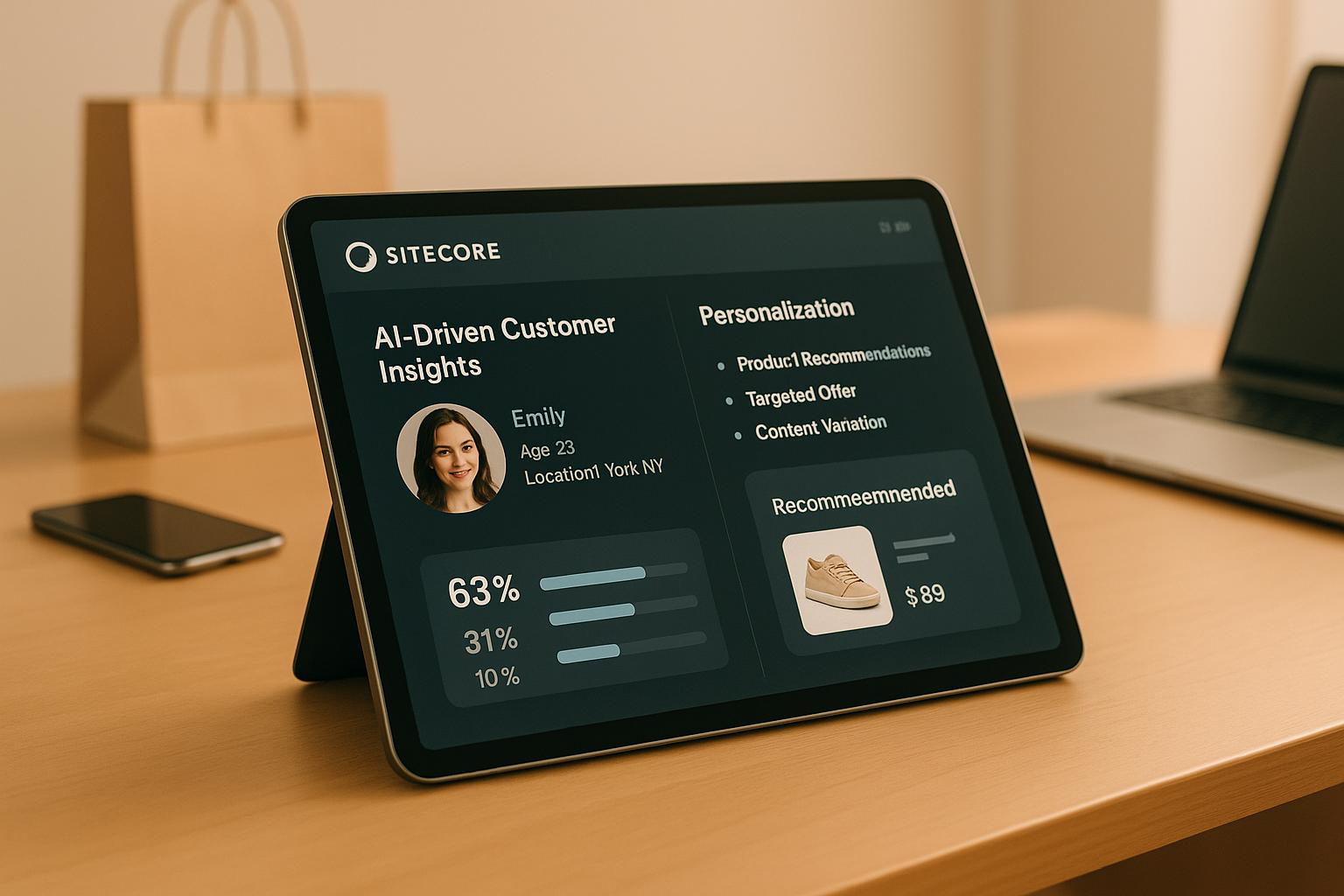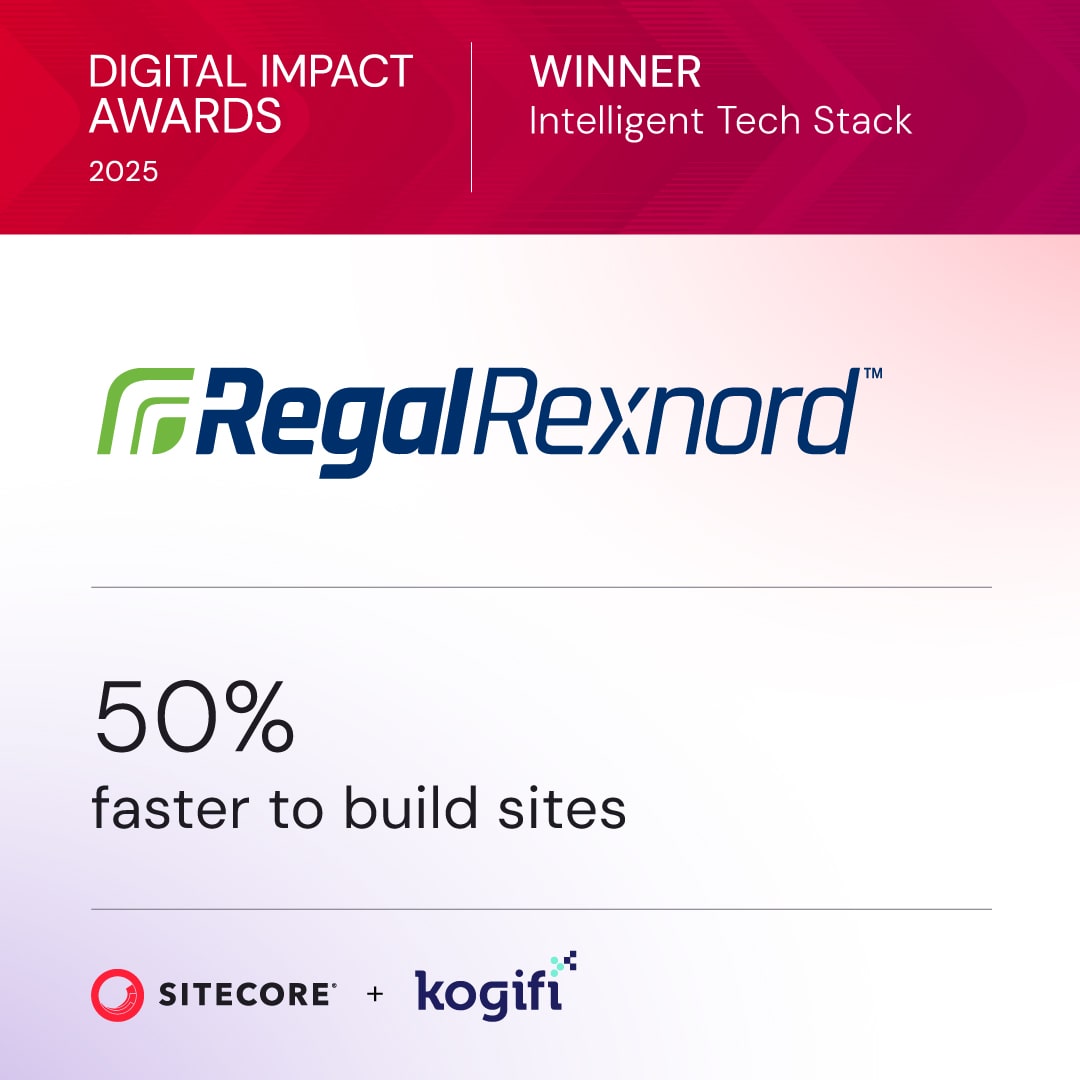Sitecore empowers direct-to-consumer (D2C) brands to thrive by solving key challenges like customer acquisition costs, competition, and managing customer experiences. Here's how:
- AI-Powered Personalization: Tailors customer experiences using real-time data and AI tools, boosting engagement and conversions by up to 19%.
- Omnichannel Content Delivery: Ensures consistent messaging across web, mobile, email, and in-store platforms, driving higher loyalty and sales.
- Customer Data Integration: Centralizes first-party data for actionable insights, enabling real-time decisions and personalized content.
- Scalable Architecture: Its modular design allows businesses to select tools that meet specific goals, supporting growth and flexibility.
With D2C sales projected to reach $1.5 trillion by 2025, Sitecore provides the tools to create memorable customer experiences, optimize campaigns, and increase revenue. Whether through personalization, omnichannel strategies, or data-driven insights, Sitecore helps brands connect directly with consumers effectively.
Sitecore Virtual Developer Day 2022

Sitecore's AI-Driven Personalization for D2C Success
Artificial intelligence is reshaping how direct-to-consumer (D2C) brands connect with their audience. With AI adoption in marketing projected to grow by 30% annually through 2028, companies are racing to implement smarter tools to engage customers. Sitecore's AI-powered personalization tools provide D2C brands with the tools they need to stand out in a crowded market.
Why does this matter? Because 76% of consumers feel frustrated when businesses fail to deliver personalized interactions. On the flip side, fast-growing companies see 40% more revenue from hyper-personalization compared to their slower-growing competitors. For D2C brands, personalization isn’t just a nice-to-have - it’s a driver of real revenue growth. Here’s how Sitecore leverages AI to create tailored experiences for customers.
Using AI for Tailored Customer Experiences
Sitecore uses AI to analyze customer behavior, purchase history, and real-time interactions to craft personalized experiences. When paired with generative AI tools like ChatGPT, Sitecore Personalize can produce custom content - articles, recommendations, images, and videos - designed to resonate with individual customers.
The results speak for themselves. Yves Rocher saw an 11x increase in purchase rates by using AI to generate personalized recommendations compared to standard top-seller suggestions. Similarly, HP Tronic, a consumer electronics retailer in the Czech Republic and Slovakia, achieved a 136% boost in new customer conversion rates by tailoring website content with AI.
"By marrying Sitecore's robust personalization capabilities with the power of GenAI technologies, we can create content that is not only highly personalized, but also deeply engaging to users."
- Sarah O'Reilly, Surya Shanmugam, Sitecore Staff
Personalized recommendations are key to success, especially since 67% of customers cite relevant product suggestions as the most important factor in deciding whether to complete a purchase. Sitecore’s AI doesn’t just throw out random suggestions - it predicts customer needs based on past interactions, offering products and deals that feel intuitive and helpful.
Activating First-Party Data with Sitecore's CDP
In today’s privacy-conscious world, first-party data is a goldmine for D2C brands. Sitecore’s Customer Data Platform (CDP) helps businesses gather, analyze, and activate this data for targeted campaigns. By pulling information from every customer interaction, the platform builds detailed profiles that power personalization strategies.
One standout example is TFG (The Foschini Group), a specialty retail group. During Black Friday, they used an AI-powered chatbot on their website and saw impressive results: a 35.2% jump in online conversion rates, a 39.8% increase in revenue per visit, and a 28.1% drop in exit rates.
The strength of Sitecore’s CDP lies in its ability to process real-time data and make instant decisions about what content to show customers. This ensures that visitors see relevant products, offers, and content the moment they arrive. In fact, 82% of businesses using AI personalization report five to eight times the return on their marketing spend, making it a smart investment for D2C brands aiming to lower customer acquisition costs.
Examples of Personalization in Action
Real-world examples highlight how Sitecore’s AI and data tools transform customer experiences. A travel retailer, for instance, integrated Sitecore Personalize with Content Hub, ChatGPT, and its database to create a seamless booking journey. The system used real-time data - like articles read and preferred activities - to suggest the next best content and generate tailored recommendations. ChatGPT created personalized articles, Content Hub provided relevant visuals, and the platform recommended trips based on specific interests, such as "hiking in Asia" with a focus on local cuisine.
Benefit Cosmetics in the UK took a different approach by enhancing email campaigns. By triggering follow-up emails based on a customer’s last action, they achieved a 50% increase in click-through rates and a 40% boost in revenue. Similarly, HMV, a British music retailer, used AI to segment audiences and personalize ad targeting, resulting in a 14% week-over-week lift in campaign revenue.
The impact of personalization goes beyond numbers. Seventy-eight percent of customers say AI-driven personalization makes them more likely to repurchase because it feels like the brand understands them better. For D2C brands, this emotional connection translates into higher customer lifetime value and reduced churn.
To achieve these results, businesses should start with clear goals, whether it’s increasing conversions, driving engagement, or building loyalty. Testing and refining strategies through A/B and multivariate testing can help ensure personalization efforts deliver tangible results. By focusing on a few high-impact areas first, brands can scale their efforts effectively. Sitecore’s AI tools provide the foundation for D2C brands to create meaningful, measurable customer experiences.
Omnichannel Content Delivery for Customer Engagement
AI-driven personalization enhances individual experiences, but omnichannel delivery ensures those experiences remain consistent across every interaction. Today’s customers often hop between devices and platforms when shopping. For example, they might browse products on their phone during a lunch break, read reviews on their laptop at home, and finalize the purchase in a physical store. Because of this, omnichannel content delivery has become essential for D2C brands aiming to stay competitive.
Here’s why it matters: Omnichannel customers spend 4% more in-store and 10% more online compared to single-channel shoppers. They also tend to be more loyal, making 23% more repeat visits to stores within six months. For D2C brands, this translates to not just higher revenue but also stronger customer relationships.
Unified Brand Messaging Across Channels
Sitecore’s headless architecture ensures consistent messaging across platforms like web, mobile, email, and even in-store displays. By decoupling content creation from its presentation, brands can create content once and distribute it across multiple formats. This approach emphasizes reusable content, making it easier to adapt successful pieces for various channels. Tools like Sitecore’s Content Hub centralize content management, enabling instant deployment across platforms.
Understanding how your audience behaves on each channel is crucial. For instance, research shows that customers who do prior online research spend 13% more in-store. This highlights how impactful online content can be on offline sales.
Sitecore XM Cloud’s "XM Cloud Pages" feature takes this one step further by allowing marketers to build customized websites and applications for different audience segments while maintaining consistent branding. Whether a customer interacts via a mobile app, email campaign, or a physical store, they encounter the same tone, visuals, and core messaging.
Once this unified messaging is in place, integrating mobile commerce becomes the next step to drive real-time engagement.
Mobile Commerce and Multichannel Integration
Sitecore’s composable architecture makes it easier for D2C brands to integrate mobile commerce into their strategy. Developers can use their preferred tech stack while benefiting from the platform’s scalability and security. Real-time analytics tools, like "XM Cloud Pages Analyze", track how mobile interactions influence conversions, offering insights into how a mobile browsing session might lead to an in-store purchase or how an email campaign drives app downloads.
Marketing automation within Sitecore ties these efforts together. It adjusts messaging automatically based on a customer’s preferred channel or past interactions, ensuring a personalized experience across the board. With 73% of customers planning to continue online shopping even post-pandemic, integrating mobile and digital touchpoints isn’t just smart - it’s essential for long-term success.
Benefits of Omnichannel Strategies
For D2C brands, a well-executed omnichannel strategy strengthens customer relationships and drives revenue growth. The contrast between omnichannel and single-channel strategies is striking:
| Feature | Omnichannel Strategy | Single-Channel |
|---|---|---|
| Customer Experience | Seamless, unified across all channels | Disjointed and inconsistent |
| Data Integration | Centralized data from all touchpoints | Siloed data, limited insights |
| Personalization | Tailored experiences based on cross-channel behavior | Generic messaging, limited personalization |
| Brand Consistency | Uniform messaging and design across platforms | Inconsistent representation |
| Analytics | Full view of the customer journey | Limited interaction tracking |
| Engagement | Higher loyalty and engagement | Lower retention and interaction |
This integrated approach gives D2C brands a clearer picture of the customer journey - from initial awareness to purchase and beyond. It also helps pinpoint which channels deliver the most value, allowing brands to allocate marketing budgets more effectively.
Sitecore’s robust analytics tools provide real-time insights into content performance and customer behavior. This allows brands to tweak strategies on the fly, doubling down on successful campaigns while addressing weaker areas. Sitecore also ensures that branding - whether tone, visuals, or messaging - remains consistent across every interaction, building trust and encouraging conversions no matter the channel.
For D2C brands ready to embrace omnichannel strategies, the key lies in setting clear objectives for each platform while maintaining a cohesive brand identity. Sitecore’s tools make this achievable without compromising on personalization or the quality of customer experiences. By leveraging these capabilities, brands can create seamless, impactful journeys that drive engagement and revenue.
Customer Data Integration and Real-Time Insights
Integrating customer data is the backbone of turning omnichannel efforts into actionable strategies for D2C brands. It’s about connecting the dots - tracking customer interactions across websites, emails, and even in-store visits - to make smarter decisions that fuel growth and enhance customer satisfaction.
Sitecore's Customer Data Platform (CDP) takes scattered customer data and transforms it into meaningful insights. By consolidating first-party data, it empowers businesses to make quick, informed decisions that directly impact revenue. In fact, companies using personalization features report an average 19% increase in conversions.
Bringing Data Together Across Channels
Sitecore CDP acts as a centralized hub, gathering first-party data from a variety of sources - both online and offline. This creates real-time, unified profiles of individual customers. It captures everything from browsing habits and purchase history to engagement data at every touchpoint.
Using advanced algorithms, Sitecore CDP merges and cleans up fragmented data. For example, it consolidates email addresses, phone numbers, and other personal details into accurate, cohesive profiles. Over time, this approach builds a single, comprehensive view of each customer by linking behavioral and transactional data.
For D2C brands, this means you can track the entire customer journey in one place - starting from product discovery and research, through cart abandonment, follow-ups, and final purchases. This unified profile lays the groundwork for real-time analytics, enabling businesses to act quickly and decisively.
Real-Time Analytics for Quick Action
Sitecore’s real-time analytics tools give D2C brands the ability to respond instantly to customer behavior. With metrics updating by the minute, businesses can seize opportunities as they arise and tackle challenges before they escalate.
Here’s how Sitecore’s tools enhance your strategy:
| Sitecore App | How It Helps |
|---|---|
| XM Cloud | Provides insights into site performance, pages, and forms via analytics dashboards. Use these insights to create personalized user experiences. |
| Sitecore CDP | Offers detailed visitor profiles, audience segmentation, and the ability to export customer data for use in external systems. |
| Sitecore Personalize | Allows real-time experiments to identify what content works best and delivers tailored experiences based on individual behavior. |
With Sitecore Personalize, you can instantly adjust content to match real-time customer actions. Meanwhile, Sitecore Experience Analytics provides both high-level and in-depth reports, helping marketers uncover trends and motivations behind customer behavior.
The Power of Acting in Real Time
Real-time insights give brands a significant edge by enabling immediate responses to customer needs and opportunities. Here’s how they compare to delayed insights:
| Feature | Real-Time Insights | Delayed Insights |
|---|---|---|
| Response Time | Act immediately on customer behavior | Identify trends hours or days later |
| Opportunity Capture | Seize time-sensitive opportunities | Risk missing key moments |
| Problem Prevention | Resolve issues before they grow | React only after problems worsen |
| Personalization | Deliver dynamic, behavior-driven content | Rely on static, historical data |
With unified customer profiles, businesses can make rapid decisions backed by context. Add AI-driven insights into the mix, and you’re equipped to anticipate customer needs and deliver personalized content at the perfect moment.
For D2C brands, this means smarter marketing investments, better conversion rates, and happier customers. Whether it’s tweaking product recommendations, sending personalized offers, or fine-tuning campaigns on the fly, real-time analytics provide a competitive edge that waiting simply can’t match.
sbb-itb-91124b2
Implementing a D2C Strategy with Sitecore
To successfully roll out a direct-to-consumer (D2C) strategy using Sitecore, you need to align your technical capabilities with clear business goals. This process requires thoughtful planning, strategic use of technology, and a strong focus on compliance - particularly for the expectations of US consumers.
Core Steps for D2C Implementation
A strong D2C foundation begins with adopting a flexible, cloud-based digital experience platform. Transitioning from Sitecore XP to Sitecore XM Cloud unlocks benefits like auto-scaling and AI-powered analytics.
For seamless content delivery, take advantage of headless and omnichannel capabilities. Using Sitecore Content Hub enables consistent content distribution across all touchpoints, including websites, mobile apps, and social media platforms. GraphQL plays a key role here, integrating content seamlessly for omnichannel delivery and ensuring uniform messaging.
Personalization is another cornerstone of an effective D2C strategy. With Sitecore CDP & Personalize, you can craft tailored experiences in real time by analyzing customer behavior. Marketing automation tools like Sitecore Send help create targeted campaigns, while A/B testing and AI-driven recommendations allow for continuous performance improvements.
To scale content effectively, implement a centralized content strategy. Tools like Sitecore Content Hub streamline digital asset management, while Sitecore Stream can automate workflows, making your content operations more efficient.
"Good content isn't about good storytelling. It's about telling a true story well."
– Ann Handley
"If you're not testing, you're guessing."
– Chris Goward, Founder and CEO of WiderFunnel
Finally, a robust data and analytics practice is essential for data-driven decision-making. Use Sitecore’s built-in analytics or integrate tools like Google Analytics to gain customer insights. Search technologies that reflect consumer intent also help fine-tune your strategy. These foundational steps ensure your D2C efforts meet compliance and customer service standards.
US Compliance and Customer Service Considerations
With the technical groundwork in place, the next step is addressing compliance and security. US consumers value transparency and control over their data, so adhering to data privacy regulations like GDPR, CCPA, and HIPAA is non-negotiable.
Implement effective consent management by using customizable banners and forms that allow users to opt in or out of data collection. Clearly communicate how their data will be used, and establish processes to manage user rights, including data access, correction, and deletion requests, in line with privacy laws.
Data security is critical for trust. Use practices like data masking, encryption (both at rest and in transit), and regular system audits to protect sensitive information. These measures not only safeguard your brand’s reputation but also ensure the seamless experiences powered by Sitecore are secure. Maintaining detailed audit trails and training employees in data protection further strengthens compliance efforts.
"At Sitecore, we recognize the immense value of data and the critical importance of safeguarding it. Our commitment to privacy and security is at the heart of every interaction with our customers, partners, service providers, and web visitors. We believe in being transparent about our data practices, ensuring you are fully informed about how your information is protected."
– Sitecore
Working with Kogifi for Sitecore Implementation

Partnering with experts like Kogifi can streamline your Sitecore implementation while ensuring compliance and technical excellence. As an official Sitecore Silver Solutions Partner, Kogifi’s certified developers bring extensive experience across Sitecore XM Cloud, XP, Commerce, CDP, and Content Hub. Their services include platform implementation, upgrades, hosting, and ongoing support, ensuring your Sitecore environment remains optimized and secure.
Kogifi’s approach integrates expertise from partnerships with Adobe and Microsoft, delivering seamless solutions tailored to your needs. Their team can help define a new digital strategy, create impactful customer experiences, and drive measurable results. Importantly, their compliance and security knowledge ensures adherence to US data protection standards, including GDPR and PCI DSS.
Conclusion: Key Takeaways for Using Sitecore in D2C
Sitecore offers a powerful digital experience platform that supports direct-to-consumer (D2C) strategies through personalization, omnichannel content delivery, and data-driven insights. By combining AI-driven personalization, real-time analytics, and consistent messaging across channels, Sitecore provides a solid foundation for brands looking to thrive in the D2C space. With over half of shoppers now purchasing directly from brands and a 31% increase in D2C purchases between 2019 and 2022, businesses need tools that can deliver exceptional customer experiences and adapt to changing consumer behaviors.
One of Sitecore's standout features is its AI-powered personalization, which allows businesses to craft tailored experiences that resonate with today’s customers. Using tools like Sitecore CDP and Personalize, companies can unify customer data and deliver relevant content at the ideal moment, boosting engagement and satisfaction.
This approach is perfectly summarized by Sitecore’s guiding principle:
"Right content. Right person. Right time." - Peter Lambrou, Sitecore Optimization Consultant MVP Strategist, Codehouse
Omnichannel content delivery is another cornerstone of Sitecore’s platform. It ensures consistent branding and messaging across all customer touchpoints - whether on websites, mobile apps, or social media. With Sitecore’s Content Hub, brands can manage high volumes of content and traffic without sacrificing performance, a critical capability given that 88% of consumers prefer buying directly from brands when possible.
Sitecore also excels in analytics, offering businesses advanced tools to make quick, informed decisions. By integrating first-party data and providing insights into customer interactions, the platform helps brands maintain control, improve profit margins, and foster loyalty.
Its composable DXP approach adds another layer of flexibility. Businesses can choose specific modules - such as Sitecore Send, CDP, Personalize, OrderCloud, and Discover - based on their unique needs. This modular design ensures that the platform can adapt as market demands evolve.
With predictions indicating that four out of five consumers will make at least one purchase from a D2C brand in the next five years, platforms like Sitecore position businesses to seize these opportunities and deliver seamless, personalized experiences.
FAQs
How does Sitecore's AI-driven personalization improve the customer experience for D2C brands?
How Sitecore Enhances Personalization for D2C Brands
Sitecore uses AI to revolutionize how D2C brands engage with their customers. By analyzing individual preferences and behaviors, it delivers real-time, personalized experiences that feel tailored to each user. The result? More meaningful interactions that drive customer satisfaction and loyalty.
With Sitecore, brands can tap into powerful tools like personalized product recommendations, dynamic content delivery, and predictive insights. These features ensure every customer interaction feels relevant and smooth, helping D2C brands strengthen relationships and meet their business objectives.
How does Sitecore's omnichannel content delivery enhance D2C strategies and improve customer engagement?
Sitecore's omnichannel content delivery ensures customers enjoy a smooth and unified experience across all platforms, whether they're interacting online or offline. By providing real-time personalized content that aligns with individual preferences and behaviors, businesses can create deeper connections with their audience and enhance customer satisfaction.
For D2C brands, this means reaching customers wherever they are - be it on websites, mobile apps, social media, or even in physical stores. This capability not only strengthens customer loyalty but also drives improved business results. With Sitecore's advanced tools, companies can craft meaningful and engaging interactions that keep customers coming back for more.
How does Sitecore's Customer Data Platform (CDP) help D2C brands use first-party data for real-time insights and smarter decisions?
Sitecore's Customer Data Platform (CDP) gives D2C brands the tools to gather and analyze first-party data in real time. By pulling together information from multiple sources - like websites, mobile apps, and in-store interactions - it provides businesses with a comprehensive view of their customers.
Armed with these insights, brands can make quicker, informed decisions and create highly personalized experiences. For instance, Sitecore's CDP supports real-time activation of targeted campaigns, dynamic content, and customized product recommendations. This not only strengthens customer relationships but also drives meaningful results for businesses.








































